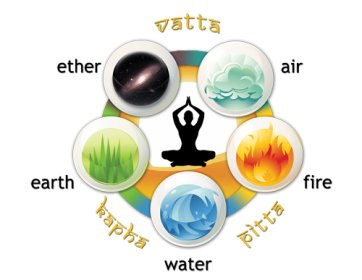Introduction: Rooted in Indian scriptures known as Veda, Ayurveda, the ancient Indian system of medicine offers a holistic approach to health and wellness. Central to Ayurveda are the concepts of the five elements and doshas, which form the foundation of its philosophy. Understanding these fundamental principles provides a comprehensive understanding of Ayurveda for achieving optimal health and balance.
The Five Elements: Ayurveda believes that all matter in the universe comprises five essential elements, known as the “Pancha Mahabhutas.” These elements are:
- Earth (Prithvi): Earth represents stability, solidity, and structure. It provides the foundation for all living and non-living things.
- Water (Jala): Water signifies fluidity, cohesion, and adaptability. It governs bodily fluids, circulation, and flexibility.
- Fire (Agni): Fire embodies transformation, metabolism, and digestion. In the body, it regulates processes like digestion and metabolism.
- Air (Vayu): Air symbolizes movement, mobility, and expansion. It governs functions related to circulation, respiration, and elimination.
- Space (Akasha): Space represents existence’s expansive, ethereal aspect. It provides the context for the other elements to interact.
The Doshas: In Ayurveda, every individual is believed to possess a unique constitution, or “Prakriti,” determined by the dominance of specific doshas. There are three primary doshas, each associated with a combination of the five elements:
- Vata: Dominated by the elements of air and space, Vata is characterized by qualities like dryness, coldness, and lightness. Vata governs movement-related functions like nerve impulses, circulation, and breathing. When in balance, Vata individuals are creative, energetic, and agile. Imbalance can lead to anxiety, insomnia, and digestive issues.
- Pitta: Comprising the elements of fire and water, Pitta is characterized by qualities like heat, sharpness, and intensity. Pitta regulates digestion, metabolism, and body temperature. Balanced Pitta types are intelligent, determined, and focused. Excess Pitta can result in irritability, inflammation, and acidity.
- Kapha: Dominated by earth and water, Kapha exhibits qualities of heaviness, stability, and moisture. It governs structure, lubrication, and immunity. Balanced Kapha individuals are calm, compassionate, and nurturing. Excess Kapha may lead to lethargy, weight gain, and congestion.
Balancing the Doshas: Ayurveda’s primary goal is maintaining harmony among the doshas to achieve optimal health. Individuals can make lifestyle and dietary choices according to their unique constitution to balance the doshas. For example, Vata types benefit from warm, nourishing foods, while Pitta types thrive on cooling, hydrating meals. Kapha types benefit from spicy, light foods that stimulate digestion. Regular exercise, meditation, and Ayurvedic herbs can help balance the doshas.
Ayurveda’s profound wisdom lies in its understanding of the five elements and doshas, providing a holistic approach to well-being. We can achieve physical, mental, and emotional harmony by recognizing our unique constitution and working to balance our doshas. Ayurveda empowers individuals to take charge of their health by making conscious diet, lifestyle, and self-care choices. This ancient system offers a timeless and effective path to holistic wellness, promoting balance and vitality for a fulfilling life.
Incorporate these insights into your holistic health strategy, and you’ll not only optimize your well-being but also gain a deeper appreciation for the profound wisdom of Ayurveda.
Explore your unique constitution, embrace balance, and embark on a journey towards a healthier, more harmonious life with AyurRoots Ayurveda Wellness.
“Embrace the art of conscious choices for your health and wellness journey, painting a vibrant masterpiece of vitality and joy daily!”
Vd. Meenakshi Gupta








No Comments